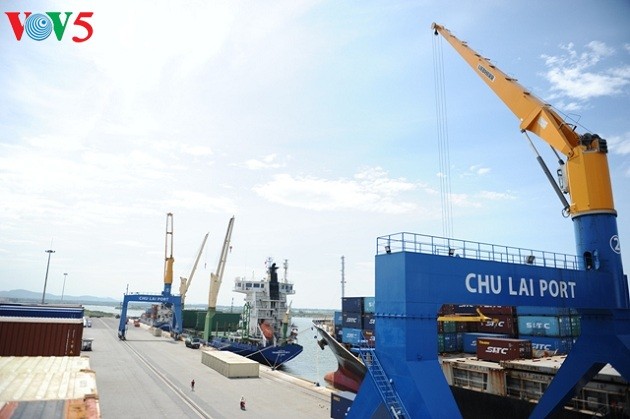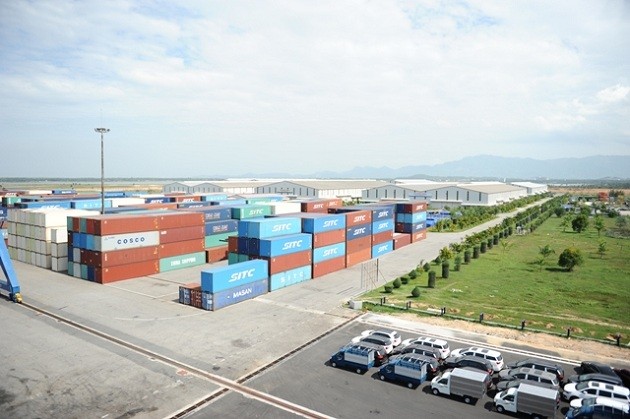(VOVWORLD) - After nearly a year, the Chu Lai port expansion project of the Chu Lai Open Economic Zone in Quang Nam has been completed. The port has expanded the zone’s logistics service chains to make it a key logistics hub in the central region.
|
 Chu Lai port has been expanded and equipped with a modern crane system. Chu Lai port has been expanded and equipped with a modern crane system.
(Photo: Vinh Phong)
|
Chu Lai port is now 500 meters long with a berth-side depth of 9.5 meters. It is capable of receiving three 20,000-ton vessels at one time, including cargo ships and tankers.
Its warehouse and workshop system has grown from 71,000 to 91,000 square meters.
Chu Lai Port was built in 2010 and put into operation in May, 2012. It is a seaport with a 11-km access channel that is connected to National Highway 1A and the Da Nang-Quang Ngai Highway. The port is built on a modern port model with a berth-to-shore structure, using advanced Larsen technology. Its capacity is 1.5 million tons of cargo and 150,000 TEUs of containers per year.
Tran Huu Hoang, the port’s Director, says the project cost 5.2 million USD, raising the total investment to more than 35 million USD since 2010.
He noted: “Chu Lai port, also known as Chu Lai-Truong Hai port, now is an international seaport of Quang Nam province. It used to have only one crane of 40 tons but now has three. In the first phase, the port was 8.7m deep to serve 20,000-ton ship. In the second phase, the depth increased to 10.7 meters to accommodate vessels of 30,000 tons.”
The Chu Lai Port is divided into three separate functional areas to serve different types of cargo - containers, bulk, and liquid cargo. The port has invested in loading and unloading equipment.
Pham Van Tai, Deputy Director General of Thaco Group, says: “We plan to turn Thaco into a multi-sector group in which logistics is a new element. We hope Chu Lai port will become a logistics center of the central region offering direct maritime routes to the South Korea and Japan. Chu Lai port will export the products of Quang Nam and the Central Coast and Central Highlands region via Sai Gon port.”
 The port is now capable of receiving three 20,000-ton vessels at one time. The port is now capable of receiving three 20,000-ton vessels at one time. |
In addition transporting finished products, materials, and parts for industries of THACO in Chu Lai, the port also provides ship towing and rescue services; cargo loading, unloading, tallying, and warehousing; domestic inland shipping, and freight forwarding; bridge and berth services: and related shipping services.
 Its warehouse and workshop system has grown from 71,000 to 91,000 square meters. Its warehouse and workshop system has grown from 71,000 to 91,000 square meters. |
In the first half of this year, the port received 150 ships, towed 200 ships and handled 23,000 TEUs of containers and 140,000 tons of bulk cargo, equivalent to 600,000 tons of cargo through the port. Containerized cargos increased 10% against last year.
Mr. Hoang says: “The logistics and port development strategies go together. If a great volume of cargos transit the port, the logistics sector can develop. Thaco Truong Hai has invested in several areas to make Chu Lai a logistics center for Chu Lai Open Economic Zone, Quang Nam, and Central Coast and Central Highlands provinces. Currently Chu Lai port is linking to Saigon Newport port and Hai Phong port to create a cargo chain along the coast.”
Chu Lai has opened direct international maritime routes to South Korea, to reduce transportation costs for investors in the key economic region of central Vietnam.
From 2018 to 2020, Chu Lai Port wants Quang Nam province’s support in increasing the port’s depth to 12m to accommodate vessels of 30,000 to 40,000 tons.